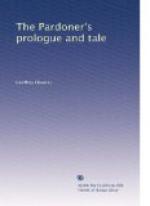|
This section contains 464 words (approx. 2 pages at 300 words per page) |

|
Irony in Pardoner's Tale of the Canterbury Tales
Summary: Essay describes the satire and irony Geoffrey Chaucer uses in "The Pardoner's Tale."
Throughout the Pardoner's Tale of the Canterbury Tales written by Chaucer, it is evident the fully developed satire of the avarice and corruption in the church during the era. Chaucer in this tale accentuates the moral characteristics of the Pardoner through use of irony and the obvious relationship between the narrator of the story (the Pardoner) and the tale that he tells (the Pardoner's tale).
Already, in the prologue, the pardoner depicts himself as a man of greed. "I preach nothing except for gain" ( ). His admittance to selling fraudulent pardons for the sole intention of unjustly gaining money contradicts his moralistic story and teaching. For example, he uses the biblical idea, that "avarice is the root of all evil"( )in his sermons. Ironically, and hypocritically, the pardoner is an extremely avaricious man, who attempts to cheat money off of travelers by granting them forgiveness for their former sins...
|
This section contains 464 words (approx. 2 pages at 300 words per page) |

|


